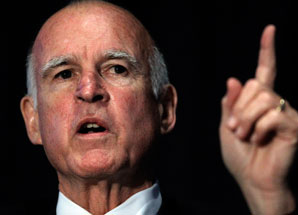If voters reject those tax increases, Brown's budget says he will call for an automatic cut of $4.8 billion from public education. That is equal to three weeks of school.
Earlier Thursday, Brown told reporters "there'll be a lot of cuts" if his initiative fails.
"Cuts are never nice, because government does a lot of good things. But we'll have the tax measure proposal, we'll have some cuts, and then we'll have some trigger cuts in the event that the tax measure does not succeed," he said.
His office has scheduled a news conference for Thursday afternoon to discuss his budget plan in greater detail.
The release of the budget for the coming year comes as California enacts $1 billion in so-called trigger cuts across a wide array of state programs, including higher education, busing for K-12 students and services for the disabled. Those midyear cuts were necessary because tax revenue was coming in much lower than Brown and Democratic lawmakers had anticipated when they passed the current budget last summer.
The governor said he is willing to call for more automatic cuts if revenue misses the mark again in the current year.
But any cuts the state will make are likely to be felt more deeply than in years past. Since the recession began in 2007, California has seen tax revenue drop $17 billion, necessitating continued cutbacks to nearly all state services.
Brown wants to raise an additional $7 billion in annual revenue through his tax increases, which would be temporary.
If voters approve them, Brown will address the $9.2 billion deficit in the coming fiscal year with a near equal balance of spending cuts and revenue increases. If they do not, the state would make $4.8 billion in additional cuts to the K-12 system, $200 million each to the University of California and California State University systems, $125 million to courts and $15 million to state forest fire protection.
About 70 of California's 278 state parks already are scheduled to close starting July 1.
Education would take the heaviest cuts if voters fail to pass the tax increases. That would undermine Brown's plans to fully fund public schools and enact systematic education reforms.
Brown told reporters last week that he wanted to protect school funding as much as possible and that schools could expect to receive even more money than last year, after several successive years of deep cuts. But in proposing trigger cuts to education, his budget released Thursday offers a warning to voters about what could happen if they fail to approve his November initiative.
In an interview with The Associated Press last week, Brown said he also planned to include some reform proposals to streamline the complicated way the state funds education programs, although he declined to go into detail. He said he would propose consolidating some of the dozens of so-called categorical funding programs that force districts to use money for specific programs.
"But I predict that schools will enjoy a rising level of funding over the next three years," he said.
When asked how he planned to achieve that, he said, "I think the economy and Proposition 98 will make it happen," referring to California's voter-approved minimum funding guarantee for K-12 schools.
